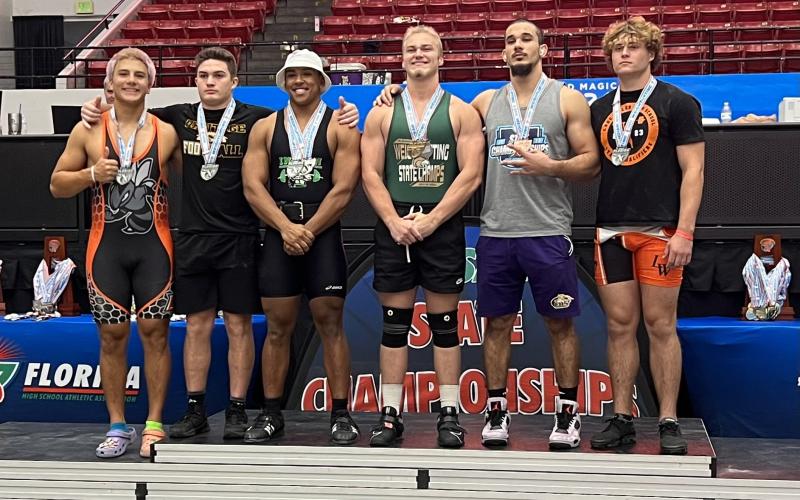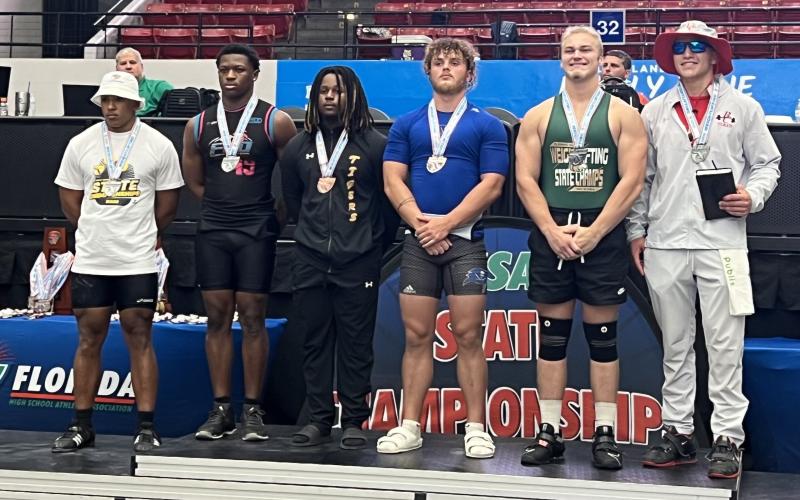LAKELAND — Brian Allen took over as Columbia’s coach midway through weightlifting season.
With his return came a new regimen and adjustments on the fly. So when the Tigers left the Class 2A state meet at RP Funding Center on Saturday with two of their four lifters reaching the medal stand, Allen was more than pleased.
Zaher Darwiche placed third in the Olympic in the 199 class with a 525 total thanks to a CHS-record 230 lift in the snatch, while Tony Fulton took third in traditional in the 199 class with a 630 total. Allen walked away proud of both after how they responded in less than a month since he returned to the job.
“Considering we only had three or four weeks with the kids, I was impressed with the way that they battled to get stronger and get their techniques back to where we left,” Allen said. “Both of those kids were with me for two years and the time after me leaving things changed, so those guys got right back into form.”
Darwiche was just five pounds off first as Fleming Island’s Jered Rhodes won the title with a 520 total, and he also lost a weight tiebreaker for second with Choctawhatchee’s Noah Brazzell. His 230 snatch was the best in his weight class and he had a shot to win the title on his final clean and jerk rep of 305, but Darwiche received two red lights to one white light to miss his second straight attempt at the weight.
Instead, his first rep of 295 was all that counted to finish five pounds short on his total.
“He should’ve won it to be honest,” Allen said. “Just the difference in opinion of one judge and he’s a state champion if he gets 305. That’s how close his third-place finish was to being a champion in the Olympic was for him.
“He killed his first lift on his clean and jerk and then his second lift he overextended with his split on his clean and jerk. And the third lift his arms broke. It was a small break in his arms that he had, which again, a difference in opinion and we have a state champion in him.”
Fulton nearly made it to the medal stand in both events but lost a five-way tiebreaker in the Olympic with a 510 total, ultimately finishing one spot away in seventh. He missed his final clean and jerk of 305 after hitting 290 on his previous lift, which would’ve put him in second in Olympic.
That 305 also would’ve placed Fulton second in traditional as he later benched a season-best 340.
“At state it’s go big or go home, so at that point it was try whatever you want to try and he did,” Allen said. “But he did exceptional in his bench. Tony hadn’t benched 340 this year and he probably could’ve got 345. But at that point it was try whatever you want because as a senior it’s your last shot.”
Tyson Yaxley was 14th in traditional at 183 with a 535 total for Columbia. Teammate Au’vontae Smith was eliminated early in traditional when he scratched his three clean and jerk reps in the 238 class.
Allen says he was proud of the group for adjusting programs on the fly after he took over in late March. The plan next year is to not take just four lifters to state but several like Allen’s teams did in the past when he was in charge from 2011-2020.
Winning a state title is an achievable goal in Allen’s eyes, especially after Fleming Island and Choctaw tied with 19 points for first in traditional. Allen’s had teams in position to reach that in the past, including in 2017 when the Tigers finished runner-up.
“Next year the goal will be how it always is, which is to win one,” Allen said. “But the way you win one is to take two people on every weight class. Not four kids (total) but two in every weight class. If you’re taking 19, 20 lifters to a championship, those teams are the ones that are usually winning it. And you don’t have to have 19 or 20 if you have 12 or 15 and eight of those are first-place finishers. Nineteen points won it in the traditional this year, so we’re already identifying them now — kids that have good technique and form and have learned this stuff since we got back in here. So, we’ll have a solid group next year and that’s one I’ll be able to evaluate a lot more.”


